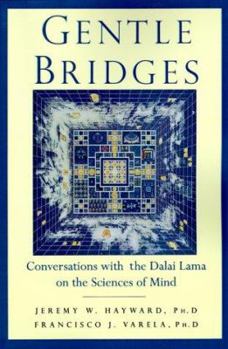Gentle Bridges: Conversations with the Dalai Lama on the Sciences of Mind
Select Format
Select Condition 
Book Overview
No Synopsis Available.
Format:Paperback
Language:English
ISBN:1570627045
ISBN13:9781570627040
Release Date:December 1992
Publisher:Shambhala Publications
Length:292 Pages
Weight:1.12 lbs.
Dimensions:0.7" x 6.0" x 9.0"
Customer Reviews
2 ratings
Delightful Crash Course in Science and Mind
Published by Thriftbooks.com User , 20 years ago
Readers shouldn't think this book is of interest only to Buddhist adherents of any school. In a series of presentations and dialogues, contemporary scientists---Newcomb Greenleaf, mathematician and artificial intelligence researcher; physicist Jeremy Hayward, neuroscientist Robert Livingston, biochemist Luigi Luisi, cognitive psychologist Eleanor Rosch, and biologist Francisco Varela---present a wonderfully succinct and relevant crash course in contemporary science from its methodologies to its latest findings (as of 1991) and their implications for questions that western science has in common with Tibetan Buddhist thought.For it turns out that various schools of Tibetan Buddhism have been systematically investigating and building theories about the mind---how it perceives, what knowledge and thinking are, what the relationship of the individual is to common reality---for centuries. So this book reflects a true dialogue, in which western scientists and the Dalai Lama and other Buddhists present each learn from the other.In fact, several of the scientists comment on how pertinent the Dalai Lama's questions are, often anticipating the next line of research they're going to talk about. "You think like a scientist!" one of them exclaims.While the Dalai Lama explains the theories and explorations of various Buddhist schools with remarkably easy erudition, the emphasis of material in this book is on western science. This is the first of at least eight books emanating from conferences that the Dalai Lama has hosted with western scientists, on questions of mind. A much fuller presentation of Tibetan Buddhist theories of mind can be found in "Consciousness at the Crossroads," dialogues from the next conference, published by Snow Lion Press. In this book,the emphasis is on western science: the presentation and dialogue on the recent history of scientific theory pertaining to Darwinian evolution is especially valuable. There's more information about the series at www.mindandlife.org.Personally I like dialogues, perhaps because I'm an aural learner. To me these books are like plays in the mind, about the mind, and such issues as perception, altruism, and whether artificial intelligence can ever be humanly intelligent. Some of these scientists know a lot about Buddhism already, while others know very little. But they all seem impressed by the long tradition of Tibetan Buddhists in investigating phenomena of mind, and in developing a sophisticated view of how mind relates to the universe. I'm sure they are heartened as well by the Dalai Lama's attitude that Buddhist doctrine is not dogma, and if science disproves these theories, they ought to be abandoned. But it's clear that western science has much to consider that Buddhist scholars have already thought about in a way more relevant to the most advanced western science than the science of even a few decades ago. Together they may help answer perennial questions about humanity's role in the universe
The Dalai Lama's a great guy,but I think sometimes overrated
Published by Thriftbooks.com User , 22 years ago
This book presents us with a few men of ancient Eastern tradition interlocuting with a few men of Socratic Western tradition on the nature of the world around us. Before any specifics of scientific architectonics are covered, they question the method of science. Logical positivism is questioned, and they do not attempt to invalidate it but do attempt to jeopardize its optimistic infallibility. Despite this doubt, it is also discovered that the Dalai Lama's Buddhist attitude is nearly identical with science, and that he emphasizes direct experience over tradition or scripture. (though one of his sacred texts proclaims a flat Earth, he does not try to retain belief in it due to the more recent discovery that our planet is indeed not flat.) There are other times where he does however introduce the Buddhist cosmology. It has never occurred to me however that this should be of any concern to Buddhism. The stories of the Buddha himself portray him as abstaining from any theological discussions on such things as cosmogony. I ask you to recall his response to such questions as 'is the world eternal.' He did not answer. The purpose of following the Dharma was to eliminate sorrow from life, not to find answers as many neophytes to Christianity and other overly theistic religions do. So for example, I do not see why it matters so much to the Dalai Lama whether or not consciousness is generated from and dependent on brain chemistry. In the book he says that a Buddhist cannot accept this idea. He says that you must either believe that the universe just happened to form itself for no particular reason at some point or that consciousness has an eternal origin. I know that this idea is essential to some other Buddhist ideas on the nature of mind, BUT if it were proven indisputable that consciousness was only an emergent property of neurological arrangements, it would not destroy the Four Noble Truths upon which the Buddhist way of life rests. So in a certain sense these disagreements I see as outside of Buddhist concerns.Nonetheless this work is a delightful read and includes multitudes of other scientific (and Buddhist) issues like nervous systems (spanning from hydra to human), artificial intelligence, ontogenetic neurology, and behaviorism. Lots of jewels.






